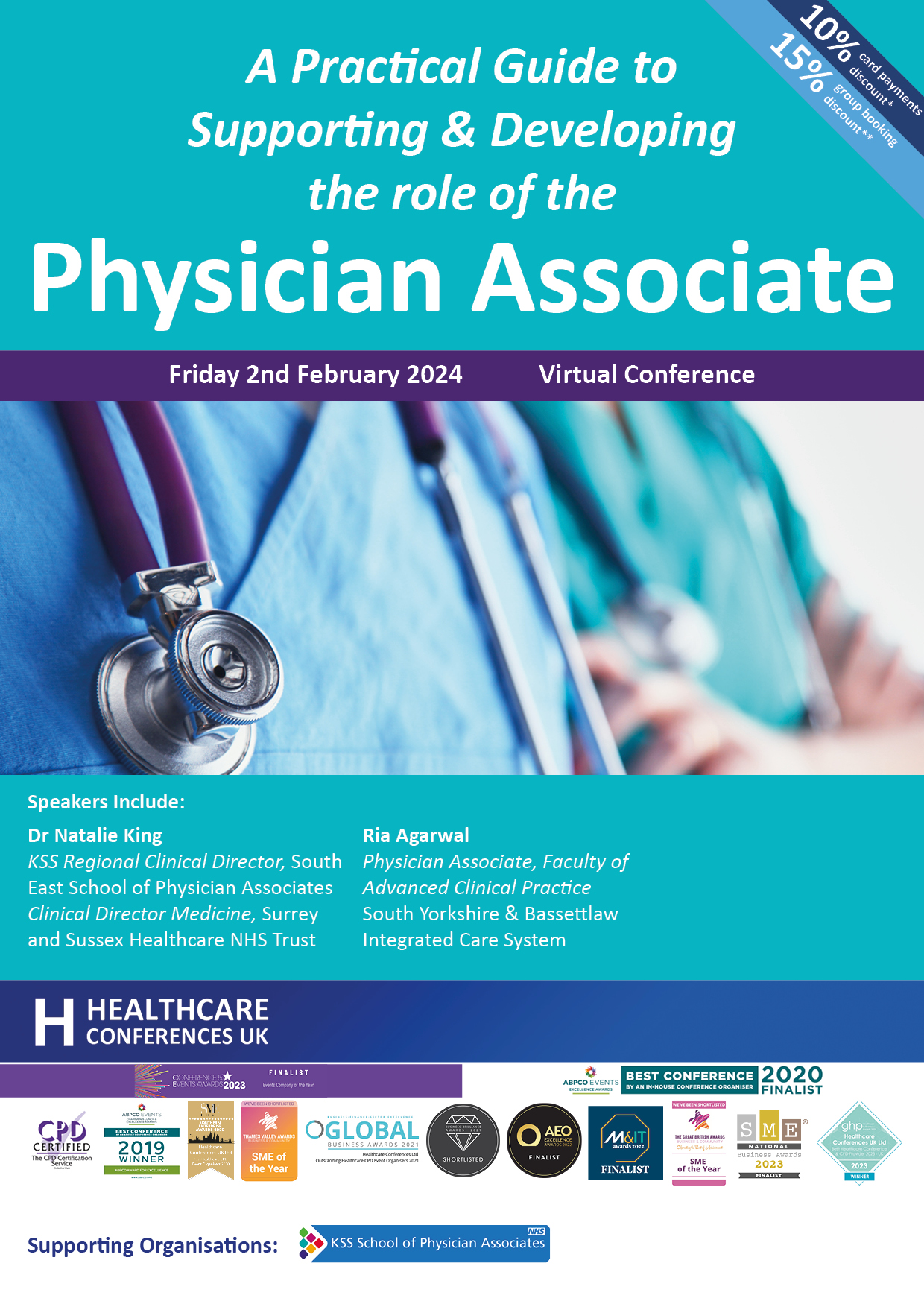Follow the conference on Twitter #PhysicianAssociate
*Reduced delegate rate for Registered and Trainee Physician Associates*
The government published a consultation on the draft legislation to bring Physician Associates into regulation in February 2023, this legislation represents the first part of the government’s commitment to ensure Pas are fully regulated by the GMC by the end of 2024.
This timely one day virtual conference focuses on developing the role of the Physician Associate in your service, how the demonstrated benefits of the role can support you and your service and improve patient care. The conference will also look at developing the role of the Physician Associate in practice and effective integration into the multidisciplinary team. Through national updates and practical case studies the conference will enable you to understand the role, the benefits and practical implications in practice for deployment in your service.
The conference will discuss supporting physician associates, accountability and supervision of Physician Associates in practice and will include case studies from Acute, Mental Health and Primary Care settings. The event will outline the PA responsibilities and limits of practice with regard to medications and prescribing both now and moving forward. There will be an update from the General Medical Council on regulation including registration requirements for Physician Associates.
The conference will include an extended focus throughout the conference on effective supervision of Physician Associates and ensuring patient safety following the recent tragic death of patient Emily Chesterton treated by a Physician Associate in General Practice, and what can be learned from this;
“Last week, the tragic and avoidable death of a young woman was discussed in parliament. The patient had presented to her general practice with, reportedly, obvious symptoms of a deep vein thrombosis and a pulmonary embolus. This diagnosis was not made then, nor after her condition worsened and she returned a week later. She died a few hours after this second visit. The patient was under the impression she had been seen by a doctor, but in fact, at both appointments, she had seen a physician associate (PA)…The overriding concern, however, should be about safety. The role description states that PAs should be supervised by doctors, but nowhere is that level of supervision defined. Most doctors are unfamiliar with PAs training and what competencies we should expect of them” Dr Helen Salisbury GP, BMJ 11th July 2023 “Physician associates (PAs) are healthcare professionals who work alongside doctors. They are not a replacement for doctors and must be supervised and employed as part of the healthcare team appropriately. The Faculty of Physician Associates (FPA) at the Royal College of Physicians (RCP) has always maintained that PAs work under the supervision of a designated senior medical practitioner, and that an individual PA's scope of practice is an agreement of delegation between that senior doctor and the PA…Statutory regulation is absolutely fundamental to ensuring that PAs remain a safe and effective workforce. The FPA and RCP have long called for physician associates to be regulated – previous delays have been frustrating, so we look forward to government laying the legislation required to bring PAs into regulation by the end of 2023. This should allow the GMC to open a register for PAs by the end of 2024.”
The conference will discuss the move towards regulation and the current GMC guidelines for Physician Associates on working within their competence
“Increasingly, physician associates (PAs) and anaesthesia associates (AAs) play key roles as part of teams in a range of healthcare settings.”
This conference will enable you to:
- Network with colleagues working to develop the role of the Physician Associate
- Reflect on the evidence of clinical impact and improvements in patient experience
- Learn from established practice on how a Physician Associate could support you and your service
- Improve the relationships and ways of working between Physician Associates and the Multidisciplinary team
- Understand and reflect on current challenges in training, education, competence and accountability
- Prescribing Rights – understand current issues and limitations of practice
- Reflect on the tragic death of Emily Chesterton and what can be learned in terms of clinical supervision and ensuring patient safety
- Examine options for Career Development and the role of the Lead PA
- Reflect on the barriers and facilitators to integration of Physician Associates into the clinical team?
- Develop the Physician Associate role in ensuring continuity of care
- Update your knowledge on national developments including Physician Associate Regulation
- Understand what support Physician Associates can provide
- Ensure clear guidance around limitations of practice including prescribing (and how this might change with regulation)
- Identify key strategies for effective Clinical Supervision
- Examine your role in supporting Physician Associates
- Learn from experienced Physician Associates in a diverse clinical areas
- Self assess and reflect on your own practice
- Supports CPD professional development and acts as revalidation evidence. This course provides 5 Hrs training for CPD subject to peer group approval for revalidation purposes
100% of the delegates who attended the last date would reccomend this conference to a colleague.



